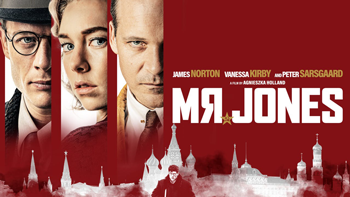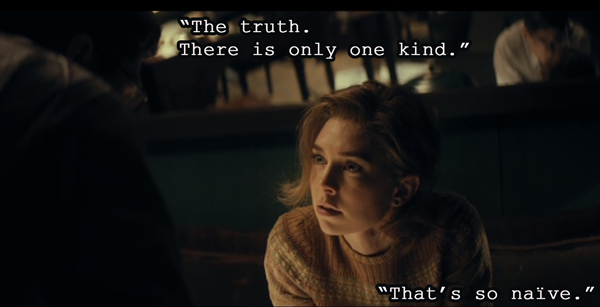This is NOT the Counting Crows song about guys dreaming of black-haired flamenco dancers in Amsterdam, nor is it that 1993 Richard Gere star-vehicle, and we’re certainly not in Indiana Jones territory.
This Mr. Jones is a movie we would hardly expect in our modern era of fake news. It’s a true story that actually tells the raw truth about Socialism, and names names.
The most important name on that hit list is not Stalin or even reluctant MP David Lloyd George, but famed journalist Walter Duranty, who received a Pulitzer the year before this “Stalin’s mouthpiece” covered up the genocidal famine happening under his nose.
It’s worth seeing; not for the whole family.
Ranking in at 84% Tomatometer isn’t bad but it could be better. Let’s figure out why.
Also check out: What to Watch: Mission Impossible, WWII edition
The Plot (Spoilers)
Mr. Jones begins with what we later realize is a flash forward of George Orwell contemplating Animal Farm. The movie returns to that creative mulling several times in an attempt to build cohesion (more on that later).
We’re introduced to Mr. Gareth Jones, 1933, relating his flight with German Chancellor Hitler and propagandist Goebbels to British MPs. They guffaw as he tells them these murderers are actively plotting the next great war.
But with more work to do, Gareth convinces Lloyd George to send him to interview Stalin because, “The numbers don’t add up.” Where is Stalin’s wealth coming from?
That is the essential question: can Gareth discover and report on the secret behind the worker’s paradise?

Gareth reaches Moscow, where he soon meets a decadent American expat journalist, Walter Duranty, and his protégé Ada Brooks. He starts an odd, not quite romantic, relationship with Ada, who tells him not to visit the Ukraine.
Gareth convinces the Soviets to send him to Ukraine, where he hops trains to ditch his escort, and ends up in the thick of a famine. Slowly, the horror overtakes him as children in the icy, desolate villages steal his food, and ultimately, eat their siblings.
Gareth is caught, dragged back to Moscow and sent home with the mission to report favorably on Ukraine or six engineers will by executed. After speaking with his agent and Orwell, and after convincing Orwell that “Stalin isn’t who you think he is,” he decides to tell the truth.
But who will believe him or buy his story? He manages to publish, and Pulitzer-winner Duranty uses the New York Times to denounce him as a liar.
Gareth retreats to Wales, where he seizes the opportunity to pitch to competing Hearst newspapers to get the word out. Ada sends him a gift of an orange to keep his spirit alive. Orwell composes Animal Farm.
As credits role, we learn that Soviets kidnapped and killed Gareth in Mongolia in 1935. Duranty is never forced to recant or give up his Pulitzer.
Problems with Mr. Jones
It’s not that the story isn’t strong. It is a lean docu-drama. Taken as such, it’s edutainment.
But it fails to develop into the kind of full narrative we came to see from Schindler’s List, Cinderella Man, or other movies based on real people.
The primary problem is Gareth. He’s a boy scout; the incorruptible, fearless protagonist who almost preternaturally knows there’s a story to discover, finds a horror too great to ignore, and reveals it against opposition that never threatens to change him, to make his character arc.

In other words, Gareth isn’t a cynical Duranty forced to become a crusader. Gareth is a superhero who completes a mission without sacrificing anything his loves or values. He’s released by the Soviets with no more than a threat against others (which they don’t carry out). Lloyd George wasn’t going to keep him around anyway so he didn’t even sacrifice his “stringer” journalist title.
In this light, every scene of conflict shows itself superficial. He struggles but never falters. He’s never denied without an easy out. He doesn’t paint himself into any corners.
Plus, he doesn’t drink. He can’t be seduced by women or drugs, and doesn’t wrestle morally with any decision he makes. Even Duranty admits that Gareth is dull.
As a traveling angel, that’s bad.
The thing about traveling angel stories is, they’re usually dynamic personalities that change the people around them (Mary Poppins, Marty McFly, Axel Foley). Ada does develop a little, finally finding the backbone to stand against Duranty, but she doesn’t join the fight. She’s never in the cross hairs, but disappears back to Germany.
Fixing Mr. Jones
To elevate a true story, we must establish a very real, palpable character while retaining the story’s essential truth. The world learned about the Ukrainian Holodomor (“death by hunger” or “killing by starvation”) thanks to Gareth Jones, while the Soviets, Walter Duranty and the New York Times tried to keep it quiet.
Sure, Gareth influenced George Orwell’s Animal Farm, but these flash forwards are literary reflections that, while cool, don’t actually move the needle. They don’t hit the audience viscerally, and unfortunately, the book isn’t as widely read as it should be today.
So, instead, let’s apply some tools from my Pre-Script Pro-Strategy Course to the core of Mr. Jones.
Fixing the Villain: Walter Duranty
Duranty is a good villain but not quite a great one. We don’t really get to see his mind work. Yes, he’s a degenerate (and purported Satan worshiper), but the movie paints him as a cynical functionary, seemingly trapped in an unfortunate position: he fathered Russian kids whom he might have to leave behind if he flees the country. That’s the leverage that makes him accept the party line without question?
Yes, he said the famous, “you can’t make an omelette without breaking eggs” line — but as it turns out, Walter REALLY believed in the cause. In 1932, when he received his Pulitzer, he said, “I learned to respect the Soviet leaders, especially Stalin, whom I consider to have grown into a really great statesman, and their [the Bolsheviks’] planned system of economy, despite present imperfections.”
To friends in private, he estimated ten million dead Ukrainians as part of Stalin’s 5-year plan. In other words, unlike most Germans who looked the other way during the holocaust, this guy supported genocide with his eyes open!
What a great scene it would be — instead of Duranty telling Gareth that he interceded for him just as he’s deported — imagine a moment where Duranty himself has to convince Gareth to lie or he’ll never leave Russia alive.
Gareth says, “You don’t know. Whole villages, dead. Children eating children! For a 5-year plan?”
Duranty interrupts, “International recognition! Europe. United States. League of Nations. The future is socialism. Global socialism. You think the lives of a bunch of Kulaks –”
“Innocent farmers!”
“You could die too,” Duranty presses, “For the workers of the world, you tell the world Ukraine is fine.”
“Like hell I will! This is genocide. Over a million —”
“Ten million,” Duranty corrects, stunning Gareth: “And counting. And those 6 engineers in the line-up? They have YOUR name on them. I don’t have time to explain the world to you. You hold the lie or they die. Or you can die here. Now how much is your moral indignation worth?”
You see, at the end of Act 2, we want a punch, but more: protagonists are only as strong as antagonists make them. This confrontation reveals the villain’s true character in a way that forces our protagonist to compromise.
It’s not enough to show injustice. in Robert McKee’s Story, the “Negation of the Negation” concept pushes us to show evil institutionalized or internalized, or both. Then you know you’ve hit villainy on the head.
In our era of fake news, where journalists play kingmakers and ignore atrocities that don’t serve the narrative, we can believe that Duranty, and possibly the NY Times, are complicit in the Holodomor because they want international socialism to succeed.
Fixing our Protagonist: Gareth
Gareth is not only the protagonist but the story’s “center of good.” That’s not unusual but it’s harder to write because flawed characters that arc satisfy audiences. As such, our choices are:
- Create a testing story, where he wavers but ultimately does the right thing with a new appreciation for his virtue, or
- Someone else fulfills the character arc based on his choices (traveling angel story).

Why not both? I don’t know if Gareth was actually caught and deported or if he just investigated and left. Assuming the latter, we can play with the former all we want: what if he suspected capture, and so, he gave the evidence to Ada? That is, if captured, Ada would take the camera and notes out of Russia…
But she takes them to Duranty instead? And Duranty turns him in.
What does that do? Her betrayal expands/deepens the theme. After all, Gareth carries the theme: “I don’t have an agenda. Unless you call truth an agenda… Journalism is the noblest profession. You follow the facts, wherever it leads. You don’t take sides.”
Duranty obviously took sides on a macro-level. Ada’s betrayal makes it personal and it expresses the counter-argument that some truths can’t be revealed.
Remember, Gareth’s choices need to be visceral. Of course he (and anyone else!) would lie to the Soviets to get deported rather than shot. Of course sacrificing six people to expose an ongoing genocide is justifiable (i.e. weak dilemma).
Plus, the betrayal provides a superior extended conflict. After seeing how Duranty betrays Gareth, Ada regrets her decision, steals the notes and camera back, and redelivers them to Gareth.
But because of the betrayal, their relationship is doomed (expanded theme: truth = consequences). Perhaps Gareth is willing to forgive but she fears Soviet retribution if he publishes (increasing the stakes by keeping it personal). The more he struggles to get the truth out, the more dangerous his future and the more distant Ada becomes.
The result: his virtue is now earned through the sacrifice of his relationship.
And that’s proven true in history because the Soviets DID kidnap and kill Gareth in Mongolia.
Conclusion
What’s your solution? Which tools would you use to level-up the story?
If you think my approach feels too Hollywood, imagine the cinematic temptation to have Gareth try to save that screaming infant’s life (The Constant Gardener) only to make the “Sophie’s Choice” to sacrifice her for his story? Didn’t go there, did I?
By the way, Gareth wasn’t first to the presses either. That was Malcolm Muggeridge, but, you know, screw him. Who wants a movie with that title!
But seriously, writers need dynamic solutions for their stories in order to reach a larger audience. Since we couldn’t go larger than genocide, I pressed for more intimacy (hey, worked for Juno).
Plus, we need intimate characters to help the medicine go down. Mr. Jones is prescient. It touches the zeitgeist because the New York Times IS corrupt. FAKE news is real. Global socialism and its lapdog media are STILL covering up atrocities while trying to dictate the future.
As I’m writing this article, elites are pushing for a new 5-year plan, a new “great reset” of global governance, with wealth redistribution, restrictions on civil liberties, and the scapegoating of new “Kulaks” that stand in the way of “progress.”
Mr. Jones is one of history’s great truth revealers, not just of the Holodomor, precursor to the holocaust, but to one terrible future we need to avoid. Let’s tell the story well.
